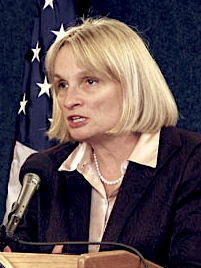Wendy Chamberlin | |
|---|---|
 | |
| United Nations High Commissioner for Refugees Acting | |
| In office February 24, 2005 –June 2, 2005 | |
| Secretary General | Ban Ki-moon |
| Preceded by | Ruud Lubbers |
| Succeeded by | António Guterres |
| United States Ambassador to Pakistan | |
| In office September 13,2001 –May 29,2002 | |
| President | George W. Bush |
| Preceded by | William Milam |
| Succeeded by | Nancy Jo Powell |
| United States Ambassador to Laos | |
| In office September 5,1996 –June 14,1999 | |
| President | Bill Clinton |
| Preceded by | Victor L. Tomseth |
| Succeeded by | Douglas A. Hartwick |
| Personal details | |
| Born | October 12,1948 Bethesda,Maryland,U.S. |
| Children | 2 daughters |
| Education | Northwestern University (BS) Boston University (MS) |
Wendy Jean Chamberlin (born 12 August 1948) is an American retired diplomat who worked for the U.S. Department of State and U.S. Agency for International Development (USAID),was the deputy to the United Nations High Commissioner on Refugees (UNHCR) from 2004 to 2007,before presiding over the Middle East Institute from 2007 until 2018. She held two ambassadorial appointments,to Laos (1996–1999) and Pakistan (2001–2002).
